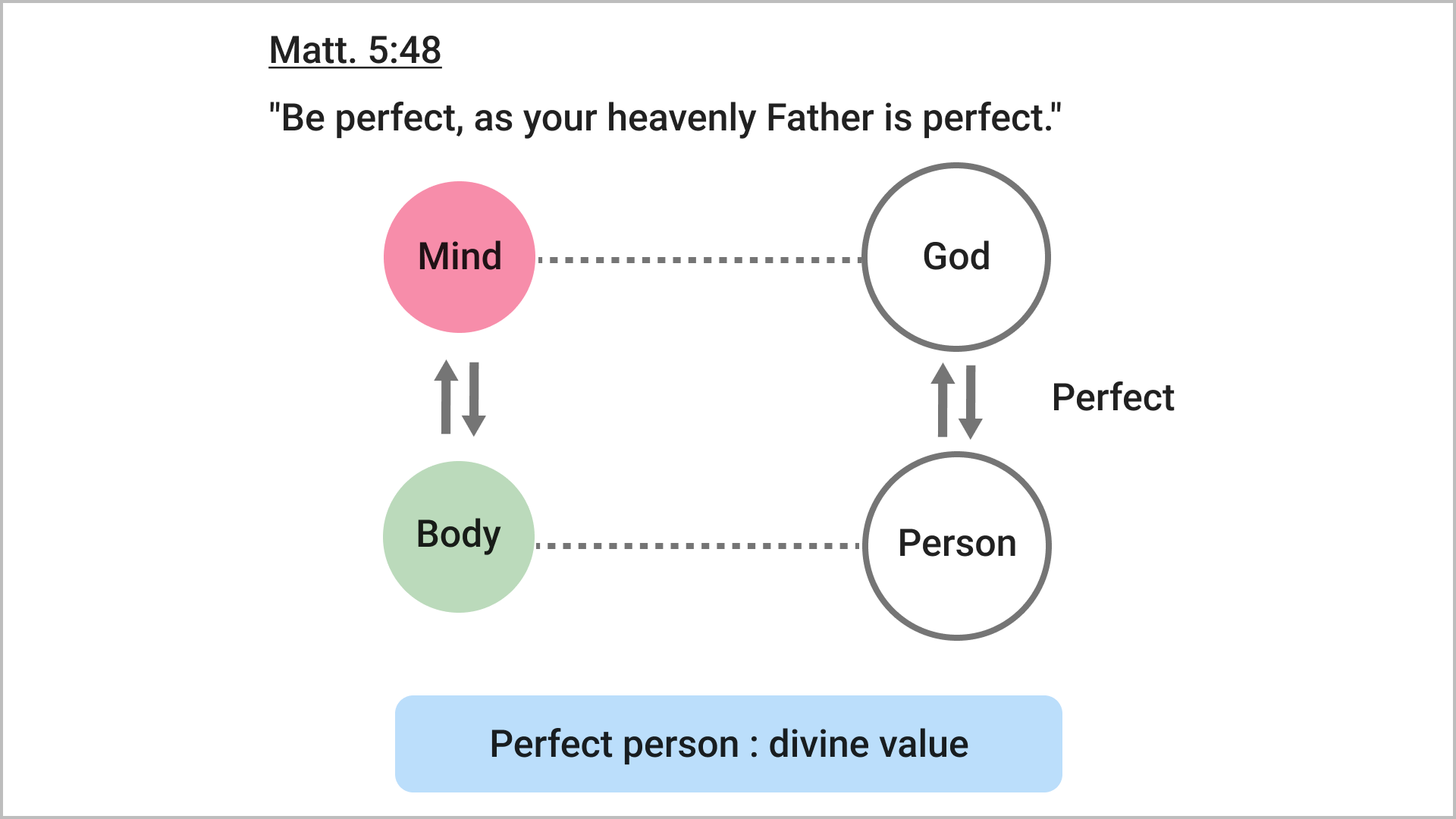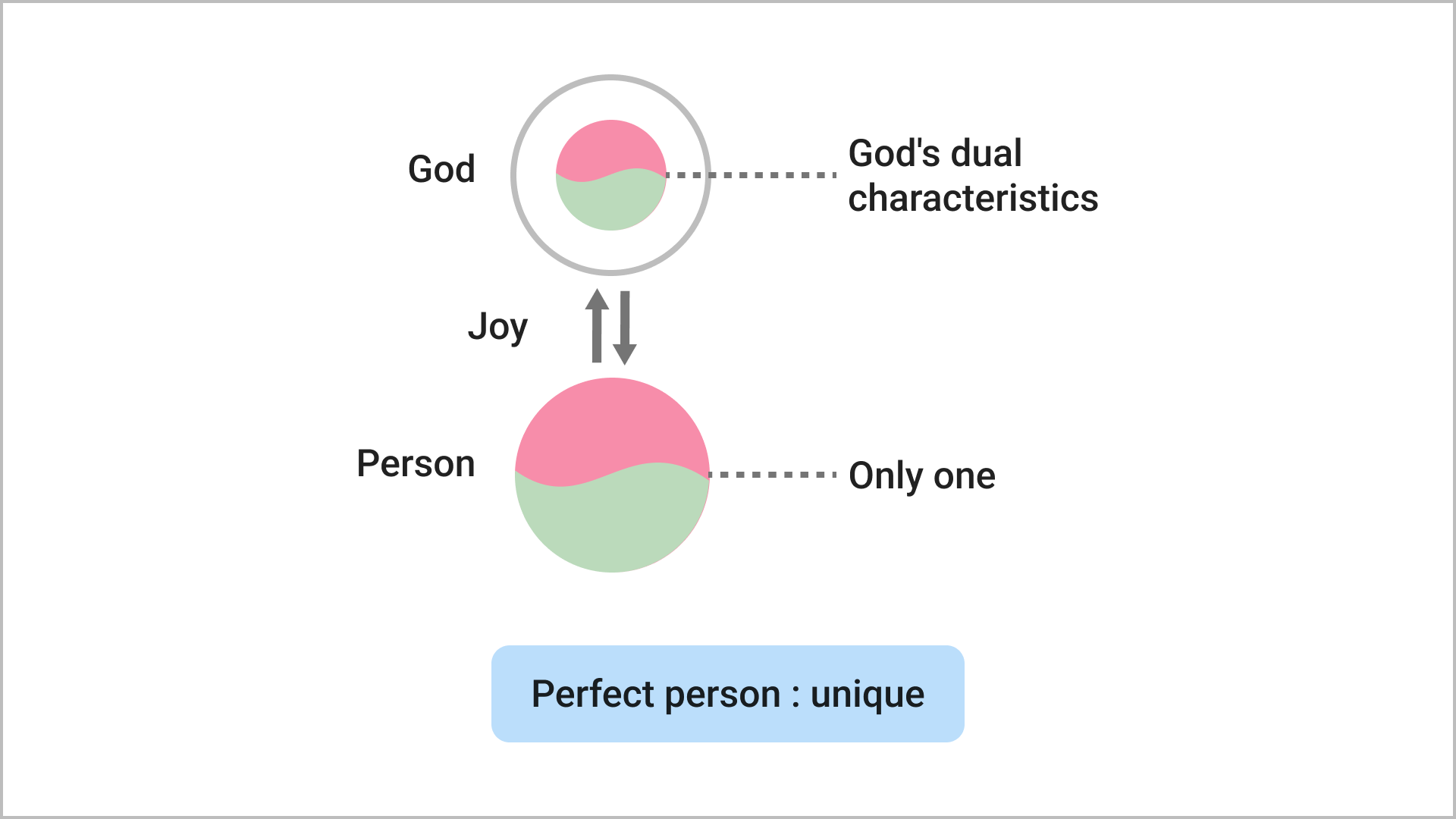Section 1. The Value of a Person Who Has Realized the Purpose of Creation
창조목적(創造目的)을 완성한 인간, 즉 완성한 아담의 가치를 우리는 다음과 같은 관점에서 논하여 보기로 하자.
Let us discuss the value of a person who has realized the purpose of creation; that is, the value of Adam or Eve in perfection. We can understand such a person’s value from several perspectives.
첫째, 하나님과 완성한 인간과의 이성성상적(二性性相的)인 관계로서 논하여 보자. 창조원리(創造原理)에 의하면 인간은 하나님의 이성성상을 닮아서 마음과 몸으로 창조되었다. 그리고 하나님과 완성한 인간 사이에도 이성성상적인 관계가 있으므로, 이 관계는 인간의 마음과 몸과의 관계로 비유할 수 있는 것이다. 무형(無形)의 마음을 닮게 하여 그의 실체대상(實體對象)으로 창조된 것이 몸인 것과 같이, 무형의 하나님을 닮게 하여 그의 실체대상으로 창조된 것이 인간이다. 그러므로 완성한 인간에 있어서의 마음과 몸이 하나님을 중심하고 하나가 될 때 서로 분리될 수 없는 것과 같이, 하나님과 완성한 인간이 사위기대(四位基臺)를 이루어서 일체가 되면 인간은 하나님의 심정(心情)을 완전히 체휼하는 생활을 하게 되므로 그 관계는 분리하려야 분리할 수 없는 것이다.
First, the relationship between God and a fully mature person resembles the relationship between the dual characteristics. Human beings were created with mind and body in the likeness of the dual characteristics of God (cf. Creation 1.1). Similarly, the relationship between God and a person who has attained perfection of individual character may be compared to that between the dual characteristics of a person, that is, between mind and body. Just as the body is created in the likeness of the intangible mind to be its substantial object partner, a human being is created in the likeness of the intangible God to be His substantial object partner. Just as there is inseparable oneness between the mind and body of a true person centered on God, there is inseparable oneness between God and a true person who together form a four position foundation. In that union, the person experiences the Heart of God as his own reality.
이와 같이 창조목적(創造目的)을 완성한 인간은 하나님이 항상 거하실 수 있는 성전(聖殿)이 되어(고전 3 : 16) 신성(神性)을 가지게 된다(전편 제1장 제3절 Ⅱ). 이렇게 되면 예수님이 말씀하신 대로, 인간은 하늘 아버지의 온전함과 같이 온전한 인간이 되는 것이다(마 5 : 48). 그러므로 창조목적을 완성한 인간은 어디까지나 하나님적인 가치를 가지게 된다.
Having a fully mature character, such a person is a temple of God, in whom God can dwell continually, and comes to possess a divine nature (I Cor. 3:16); (cf. Creation 3.2). Jesus spoke of this state of perfection, saying “You, therefore, must be perfect, as your heavenly Father is perfect” (Matt. 5:48). Thus, we see that a person who has realized the purpose of creation assumes a divine value, comparable to God.

둘째, 인간 창조의 목적을 중심하고 그 가치를 논하여 보자. 하나님이 인간을 창조하신 목적은 인간을 통하여 기쁨을 누리시고자 하는 데 있었다. 그런데 인간은 누구나 딴 사람이 가질 수 없는 특성을 각각 지니고 있기 때문에, 그 수가 아무리 많이 번식된다 하더라도 개성이 똑같은 사람은 하나도 없게 마련이다. 따라서 하나님에게 내재(內在)하고 있는 어떤 개성체(個性體)의 주체적인 이성성상(二性性相)에 대한 자극적인 기쁨을 상대적으로 일으켜 드릴 수 있는 실체대상은, 그 이성성상의 실체로서 전개된 그 한 개성체밖에는 없는 것이다(전편 제1장 제3절 Ⅱ). 그러므로 창조목적을 완성한 인간은 누구를 막론하고 이 우주간(宇宙間)에 있어서 유일무이(唯一無二)한 존재인 것이다. 석가가 ‘천상천하유아독존(天上天下唯我獨尊)’이라고 한 것은 이러한 원리로 보아서 타당한 것이다.
Second, let us consider the value of a human being from the perspective of the purpose for which he was created. God created human beings for the purpose of sharing joy with them. Every human being possesses a unique individual character. No matter how many billions of people are born on the earth, no two will ever have exactly the same personality. Each person is God’s substantial object partner who manifests a distinctive aspect of God’s dual characteristics. Hence, that person is the only one in the entire universe who can stimulate that distinctive aspect of God’s nature to bring Him joy (cf. Creation 3.2). Every person who has completed the purpose of creation is thus a unique existence in the cosmos. We can thus affirm the truth in the Buddha’s saying, “In heaven and on earth, I alone am the honored one.”

셋째, 인간과 피조세계(被造世界)와의 관계로 본 그 가치를 살펴보자. 우리는 창조원리에 의한 인간과 피조세계와의 관계를 앎으로써 완성한 인간의 가치가 어떠한 것인가 하는 것을 알 수 있게 된다. 인간은 영인체(靈人體)로는 무형세계(無形世界)를, 육신(肉身)으로는 유형세계(有形世界)를 각각 주관하도록 창조되어 있다. 그러므로 창조목적을 완성한 인간은 전피조세계의 주관자가 되는 것이다(창 1 : 28). 이와 같이 인간에게는 육신과 영인체가 있어서 유형 무형의 두 세계를 주관할 수 있도록 되어 있기 때문에, 이 두 세계는 인간을 매개체로 하여 서로 수수작용(授受作用)을 함으로써 비로소 하나님의 실체대상의 세계를 이루게 되는 것이다.
Third, let us consider the value of a human being based on his relationship with the universe, as clarified by the Principle of Creation. A person who has completed the purpose of creation can govern the entire universe (Gen. 1:28). Possessing both spirit and flesh, he can rule the spirit world with his spirit self and the physical world with his physical self. With human beings acting as mediators, the two worlds enter into a reciprocal relationship and form a unified cosmos which is a complete object partner to God.
우리는 창조원리(創造原理)에 의하여, 인간의 이성성상(二性性相)을 실체로 전개한 것이 피조세계라는 사실을 알고 있다. 따라서 인간의 영인체는 무형세계를 총합한 실체상(實體相)이요, 그 육신은 유형세계를 총합한 실체상이 된다. 그러므로 창조목적을 완성한 인간은 천주(天宙)를 총합한 실체상이 되는 것이다. 인간을 소우주(小宇宙)라고 하는 이유는 실로 여기에 있다. 그러므로 인간은 천주적인 가치를 가지고 있는 것이다. 마태복음 16장 26절에 예수님이 사람이 만일 온 천하를 얻고도 제 목숨을 잃으면 무엇이 유익하리요라고 말씀하신 것도, 위에서 말한 바와 같이 인간은 천주적인 가치를 가지고 있기 때문이다.
We have learned through the Principle of Creation that the universe is the substantial unfolding of the dual characteristics of a human being. A person’s spirit encapsulates all elements of the spirit world while his flesh encapsulates all elements of the physical world. A person who has completed the purpose of creation thus encapsulates all the essences of everything in the cosmos. This is why a human being is called a microcosm of the universe. For these reasons, a human being has the value of the entire cosmos. We can thus understand the saying of Jesus in a new light, “For what will it profit a man, if he gains the whole world and forfeits his life?” (Matt. 16:26).
가령 여기에 하나의 완전한 기계가 있다고 하자. 그리고 이 기계의 모든 부속품들이 이 세상에 단 하나씩밖에 없는 것이어서 더 이상 구할 수도 없고 만들 수도 없다고 하면, 그 하나하나의 부속품은 아무리 보잘것없이 작은 것이라도 전체의 가치를 가지고 있는 셈이 되는 것이다. 이와 마찬가지로 완성한 인간의 개체는 유일무이(唯一無二)한 존재이기 때문에, 그가 아무리 미미(微微)한 것 같다 하더라도 실상 전천주적(全天宙的)인 가치와 대등하다고도 볼 수 있다.
Suppose there is a perfect machine, whose every part is the only one of its kind in the world, and there is no way to either procure or make a replacement for any of them. No matter how small or insignificant a single part may be, its value is then the same as that of the whole machine. Similarly, a fully mature person is unique in all the universe. No matter how insignificant he may seem, his value is equivalent to that of the entire cosmos.
